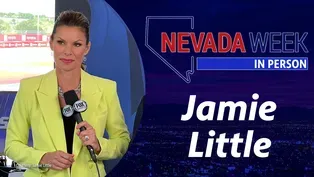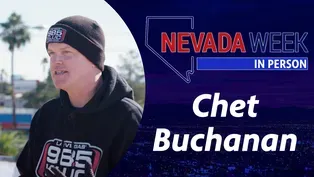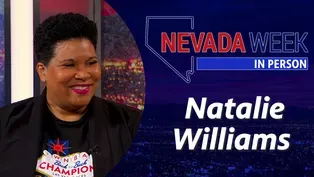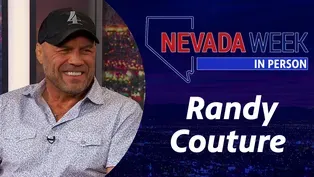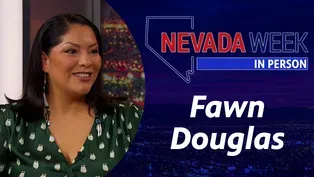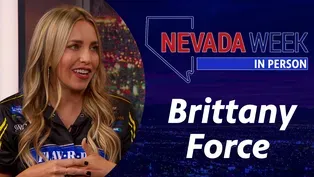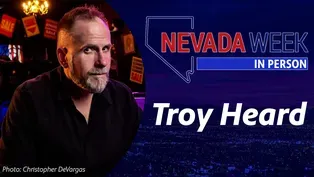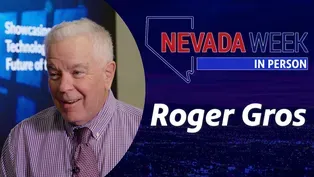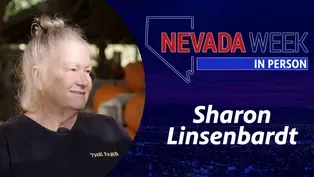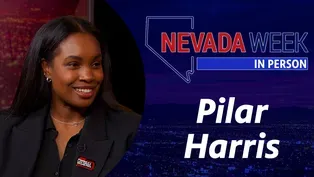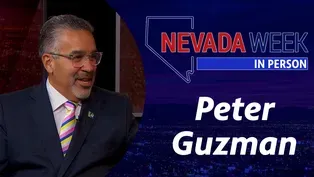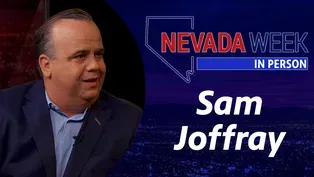
Nevada Week In Person | Lee Lanier
Season 1 Episode 59 | 14mVideo has Closed Captions
One-on-one interview with co-founder of Dam Short Film Festival Lee Lanier.
One-on-one interview with co-founder of Dam Short Film Festival Lee Lanier.
Problems with Closed Captions? Closed Captioning Feedback
Problems with Closed Captions? Closed Captioning Feedback
Nevada Week In Person is a local public television program presented by Vegas PBS

Nevada Week In Person | Lee Lanier
Season 1 Episode 59 | 14mVideo has Closed Captions
One-on-one interview with co-founder of Dam Short Film Festival Lee Lanier.
Problems with Closed Captions? Closed Captioning Feedback
How to Watch Nevada Week In Person
Nevada Week In Person is available to stream on pbs.org and the free PBS App, available on iPhone, Apple TV, Android TV, Android smartphones, Amazon Fire TV, Amazon Fire Tablet, Roku, Samsung Smart TV, and Vizio.
Providing Support for PBS.org
Learn Moreabout PBS online sponsorshipMore from This Collection
Nevada Week In Person | Jamie Little
Video has Closed Captions
One-on-one interview with Jamie Little, NASCAR Broadcaster (14m)
Nevada Week In Person | Chet Buchanan
Video has Closed Captions
One-on-one interview with Chet Buchanan,Host & Creator, 98.5 KLUC’s The Chet Buchanan Show (14m)
Nevada Week In Person | Natalie Williams
Video has Closed Captions
One-on-one interview with Natalie Williams, General Manager, Las Vegas Aces (14m)
Nevada Week In Person | Randy Couture
Video has Closed Captions
One-on-one interview with Randy Couture, UFC Hall of Famer & U.S. Army Veteran (14m)
Nevada Week In Person | Fawn Douglas
Video has Closed Captions
One-on-one interview with Fawn Douglas, Artist and Activist, Nuwu Art (14m)
Nevada Week In Person | Brittany Force
Video has Closed Captions
One-on-one interview with Brittany Force, World Champion Drag Racer (14m)
Nevada Week In Person | Troy Heard
Video has Closed Captions
One-on-one interview with Troy Heard, Artistic Director, Majestic Repertory Theatre (14m)
Nevada Week In Person | Roger Gros
Video has Closed Captions
One-on-one interview with Roger Gros, Publisher, Global Gaming Business Magazine (14m)
Video has Closed Captions
One-on-one interview with Sharon Linsenbardt, Owner, Las Vegas Farm and Barn Buddies Rescu (14m)
Nevada Week In Person | Pilar Harris
Video has Closed Captions
One-on-one interview with Pilar Harris (14m)
Nevada Week In Person | Peter Guzman
Video has Closed Captions
One-on-one interview with Latin Chamber of Commerce Nevada President & CEO Peter Guzman (14m)
Nevada Week In Person | Sam Joffray
Video has Closed Captions
One-on-one interview with Sam Joffray, President & CEO, Las Vegas Super Bowl LVII Host Com (14m)
Providing Support for PBS.org
Learn Moreabout PBS online sponsorshipA multifaceted artist and film director, Lee Lanier, co-founder of Nevada's largest film festival, is our guests this week for Nevada Week In Person .
♪♪♪ Support for Nevada Week In Person is provided by Senator William H. Hernstadt.
-Welcome to Nevada Week In Person .
I'm Amber Renee Dixon.
His titles are too many to list but include animator, author, and painter.
And it was in the early 2000s when he and his wife started The Dam Short Film Festival in Boulder City, now in its 19th year and it's first back in-person in two years.
Lee Lanier, thank you for joining Nevada Week In Person .
(Lee Lanier) Happy to be here.
-So coming off two years of a virtual experience for the film festival, due to COVID, how big of a deal is it to have it back in person?
-We're very excited.
There's nothing like having all the film lovers and filmmakers themselves be there in one place for five days.
-What difference does it make to have people viewing films in person sitting side by side?
-Well, you get the reaction.
For example, a comedy, you can watch it by yourself in your house and it might be pretty good, but seeing it with a big audience, it's fantastic.
You get like amplified reaction to it.
-And then how do you utilize that reaction to determine what you're going to be showing in the coming, coming film festivals?
Or even-- I understand there's a certain day where you're showing some of the award winning films and some of the more popular films?
-Yes, that's correct.
Well, we try to program films we think our local audiences will like.
So often we're in the back of the theater studying the reaction so we can tell which films are doing really well in a particular year and try to look for films that might be similar in future years.
And in terms of the audience reaction, well, it's just great for the filmmakers to see that reaction for their film when it's shown in person.
-When you are trying to please the local viewer, as you had said, how would you describe-- who is the average person that goes to the Dam Short Film Festival?
-Well, we have some statistics on it.
It's about 30% Boulder City, 30% Las Vegas, 30% Henderson, 5% from out of state, and 5% from Los Angeles.
-Okay, and so what are they looking for?
-Just entertainment.
It could be a film that makes them laugh, makes them cry, makes them think, surprises them, teaches them something new, for example, anything like that.
-And you have filmmakers who enter this film festival from all around the world.
At what point did you start getting international attention to this film festival, now in its 19th year?
-Fairly early on, within the first few years.
That's grown over the years, and now we have a very strong contingent from overseas.
In fact, I think we've gotten films from almost every country in the world at this point.
A few left, like North Korea.
-Okay.
-We're working on it, though.
-Is that typical for a film festival to have international entries, or did you secure that?
Did you have a special focus on that?
-No, it's not unusual for larger festivals.
I think what's great about our festival is we're relatively small for being in a small town, but we do get a lot of international attention.
-Yeah, you sure do.
Okay, so 2014, that was nine years ago, Las Vegas Weekly asked you what your greatest achievement was in the 10 years of the festival.
And your response was, quote, I'm very proud that the festival has made it 10 years.
Film festivals often go under, and a lot of times they disappear when they're younger too, after three or four or five years, end quote.
What do you contribute to this festival's longevity?
How do you explain it?
-We stick to our mission statement, which is finding the best films we can find for a local audience and treating the visiting filmmakers well.
And it seems very basic, but a number of festivals forget that.
Even if they have a big budget and a lot of people working on them, they forget what the core of it is, which is the films and the people will make the films.
-Well, and that leads me to my next question.
That latter part of treating the filmmakers well, when did you establish that, what's behind it?
-First year, because I'm a filmmaker also.
So I monitor films in the film festival circuit before we started this film festival.
So my wife and I got to see examples of great festivals and mediocre festivals and poor festivals.
And we remembered what we wanted to see in a festival if we started one ourselves.
-How were you treated?
Were there times that you were not treated well?
-Unfortunately, yes, it's true.
It could be something like miscommunication or a festival that is designed such a way it's hard to see all the events.
It's spread out, too many screens.
A number of factors that just make it not quite as enjoyable as it could be.
-Okay, so what has the response been from filmmakers that participate in your festival?
-Very good.
And the filmmakers are a critical part of it, of course, so they spread the word.
So one reason we have the reputation we have is because filmmakers have told other filmmakers.
And so we have stories about people going to public relations firms to get advice about which festivals to submit their films to, and we're in the list.
You know, amongst all the big giant ones in the world, we're still there, even though we're a small festival.
So that, I think, speaks to our treatment of the filmmakers.
-Okay, and they want to make sure that their work is shown appropriately, given the time and attention that it's due.
I can understand that.
-And that brings up other issues like poor projection, not showing the film in the correct order, showing it in the wrong aspect ratio, poor sound, and things like that.
They want to see their film presented nicely, like the way it should be, the way they intended in front of a appreciative audience.
-And that attention to detail is something that they've implemented on their own in their own films, so they're expecting the same in return.
What is life like as a filmmaker?
You mentioned you are one yourself.
-It can be hard, especially with short films.
It's not necessarily something you do to make a living; it's a passion project.
So the filmmakers, myself included, put a huge amount of work into them and then, you know, submit it to the film festival to get an audience.
It can be challenging because there's a lot of competition, so it might be hard to get into one in the first place.
And of course, again, once you're there, you prefer to see it protected correctly, right?
-What are some of the highlights of this year's festival?
-Highlights?
Well, aside from being in person, which we're very excited about, of course-- -Which is huge.
-Yes.
A lot of good films.
Every year is a little bit different in terms of the film content.
For example, this year I really liked the sci-fi films.
We have two sci-fi programs, we have two animation programs, again dear to my heart.
And it's hard to pick, because we get over 1,000 submissions, and we pare that down to 150 or so.
-Wow!
This year, 153.
So there's really some of the best films in the world right now in terms of short films at our festival.
So it's hard to pick a single program or a single film.
-How do you go about narrowing it down?
-We have a film review committee that's volunteer that watches the first round of films.
And we usually try to get, say two, three, or four people to watch each film.
They comment on the films, give recommendations, and then we have a small group of programmers who look at all the reviews, basically, and recommendations.
And then we start to choose which films are going to be in the actual programs, and we start to arrange them.
So it goes through two steps of trying to whittle it down.
-Okay.
Why is a short film-- what makes it special when compared to a feature film in your opinion?
-Well, it's, they're short, and they're like little gems.
If they're done well, it's a really sweet little story in a very small package.
And one great thing about short films is you can take risks because they're not as expensive, they don't take as long to make, and you can be a little bit more daring with your film work.
So in some ways, the creativity is greater within short films than you would see in feature films.
-Oh, that's interesting.
One to forty minutes, I believe, is a short film?
-Yes, correct.
-And then when you describe a "program" or talk about a "program," what does that entail for someone who may be going down to watch for the first time?
-Right.
For us, we group the films somatically into programs.
There might be, say four to twelve short films within a program.
So it might be a comedy program or sci-fi program, or horror program, or one of our genres.
-Oh, how neat.
So you can pick what you want to see if if you're a fan of comedy or animation, which is your specialty?
-Yes, you can pick and choose because they're thematic, or you can see every single film which some people do.
-On that aspect of animation-- well, yeah, you can buy a five day Film Festival pass.
-And people do it.
-That aspect of animation, according to your IMDB, you served as a senior animator on the DreamWorks films, Ants and Shrek .
What was that experience like?
-It was very fun.
It was a lot of work.
There's a hundred animators who worked for two years on each one of those feature films.
So it's a big production.
And so I worked within the modeling and lighting department.
So I got to model things.
Everything within the film had to be built from scratch, and do lighting, which is very film-like where you set the virtual lights and get the drama with the lighting.
-Virtual effects is also your specialty.
-Special effects, yeah.
-Special effects, I apologize.
-Oh, no, same thing.
-Visual effects, yes.
And you were doing that out in California, Palo Alto area you told me, for about how many years before you decided to actually move to Boulder City?
-It's a bit of a story.
I started out in production in Los Angeles in the early 90s, got into animation first at Disney about, it was in '94, 1994 to '96.
Then that part of Disney they shut down to build something else, so I went up to the Bay Area to work at PDI Pacific Data Images, which had been purchased by DreamWorks.
Worked there for five years, and then my wife and I decided to find a small town.
Took a tour of the Southwest and wound up choosing Boulder City.
-Why?
Why Boulder City?
-We we're looking for a small town that was cute and safe and quiet and had a walkable downtown, for example, but was still close to a major airport like McCarran, or Harry Reid Airport I guess you'd say, still close to Los Angeles, and so on.
So it kind of fit all those criteria.
-And what made you think this would be a good place for a film festival?
-One thing we noticed was that the film festivals we enjoyed were in small towns.
Sometimes-- Towns are very different from Boulder City but, nonetheless, small towns where everything was very close together, for example, Aspen or someplace like that or a small town in California.
But we liked the fact that you can walk to all the events.
You don't have to drive from one locations to another.
You don't miss anything, because we stagger the events so they're spread out.
And when we're not looking at films, it's just a very charming little town.
-If you were to talk to a student considering animation, or a child, I imagine there's a lot of people out there that would love to enter that field.
But what would you tell them that they may not understand?
-That's a good question.
I think like any program you might go into, especially the arts, you really need to apply yourself and work really hard.
You almost have to outwork your competition.
So give yourself extra homework.
Don't just do the assignment if you go to school, for example; do extra assignments you assign yourself.
Try to keep up on the latest trends, you know, the latest software, go to your life drawing classes.
Practice whenever you can, essentially.
-You've written software books, correct?
-I have.
-Also among your many titles, as I mentioned, is painter.
When did that start?
That wasn't, you know, part of your history.
-A little bit.
I've always been around the arts somehow.
Though, when I went into animation, it was computer animation.
So it's all like this.
But I've been around it.
Always drew every once in a while or occasionally would pick up the paintbrush, but I didn't decide to pursue painting in a serious manner until about 2015, 2016.
I thought, well, I'm getting older, I'll try it again.
And I actually felt I improved enough that I'm going to pursue it for real this time.
And I just started painting like nonstop.
-You're self-trained?
-Yes.
-What kind of art?
How would you describe what you do?
-Figurative and narrative.
So story-based, but also figures like people.
Mostly very large pieces with posed figures.
-And you can see this in your Downtown Las Vegas gallery?
-Yes, I have a gallery in the Arts Factory in the Arts District.
-In reading about your gallery, I wonder if that painting is still on display that you did, inspired by COVID.
-Inspired by COVID.
I have one that has-- -And workers.
-Oh, the workers, yes.
- The Essential Workers .
- Essential Workers is still in the gallery, or in the gallery right now, I should say.
And it features a number of real people who have real Las Vegas jobs, and it was a tribute to workers, people in the trenches making Las Vegas function that maybe aren't glamorized, for example.
But it's there.
-What inspired that?
-I got tired of hearing the phrase "essential workers" because anyone who is working for their family, working for their city, their town, what have you, their church, is essential.
And so I just wanted to give a tribute to those people who are working hard.
-We'll make sure to visit that.
You said you have two galleries.
-Well, I have the studio gallery in the Arts Factory.
-Okay.
-One location for a gallery, yes.
-Okay.
Visit that or the film festival, The Short Dam Film Festival-- The Dam Short Film Festival runs February 16th through 20th in Boulder City.
Lee Lanier, thank you so much for joining Nevada Week In Person .
♪♪♪
Support for PBS provided by:
Nevada Week In Person is a local public television program presented by Vegas PBS
